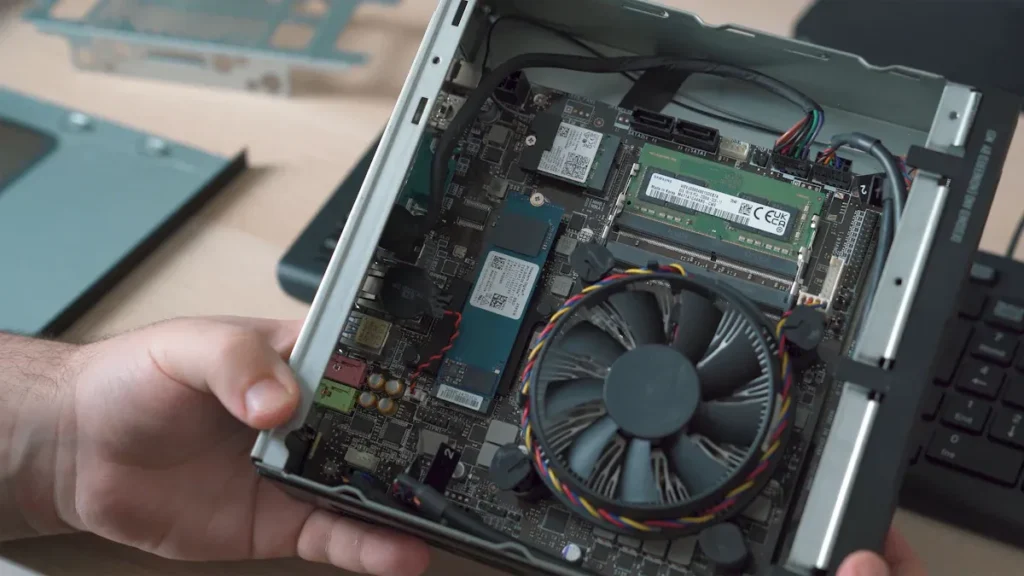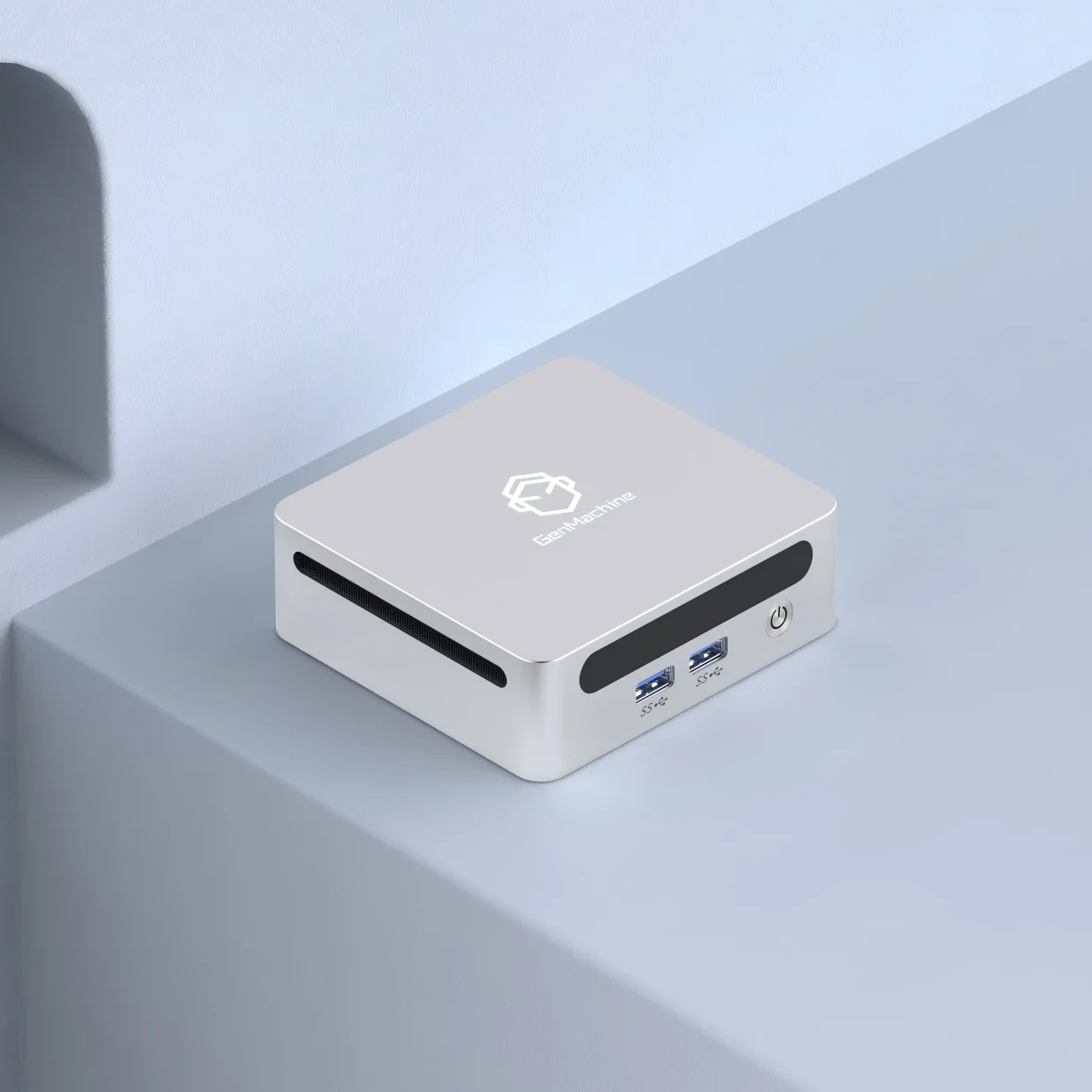Mini PCs have become increasingly popular as compact alternatives to full-size desktop computers. A growing number of users consider a mini PC for home offices, study rooms, content consumption, or even light creative work. With smaller form factors and improved efficiency, the question often arises: Do mini PCs make noise?
This article examines what generates noise inside a mini computer, how cooling influences sound, and what can be done to achieve a quieter setup. The discussion avoids technical jargon and focuses on helping consumer buyers make informed decisions.
Why Noise Matters in a Mini PC
Noise affects working comfort, concentration, and overall experience. A noisy device in a quiet room—whether during late-night work, movie streaming, or online meetings—can be distracting. Many buyers choose a mini desktop computer because of expectations for silence and a cleaner workspace. Understanding how noise is produced allows buyers to select the right design and cooling structure.
What Creates Noise Inside a Mini PC?
Noise typically originates from two internal components:
Cooling fans: Fans move air through the chassis to maintain optimal temperature. When the workload increases, the fan speed increases, which may generate noticeable sound.
Storage drives: Some older storage technologies include mechanical components that produce vibration. Modern solid-state drives operate silently.
Noise levels vary depending on chassis design, cooling method, and overall workload.

Do Mini PCs Make Noise During Everyday Tasks?
Most mini PCs remain quiet while browsing, streaming video, handling documents, or working in cloud applications. Light workloads maintain stable temperatures, requiring minimal cooling response. However, during tasks such as:
- Video editing
- Large file compression
- Gaming
- Running multiple applications simultaneously
the system temperature rises, which causes cooling fans to spin faster. A well-designed compact PC can manage these situations smoothly without creating harsh noise.
Fan-Cooled vs. Fanless Mini PCs
1. Fan-Cooled Mini PCs
These models use small internal fans. Fan-assisted cooling maintains hardware stability and supports higher performance capabilities. Noise variations depend on:
- Fan size
- Airflow efficiency
- Chassis ventilation design
Smaller fans tend to spin faster, possibly creating a higher pitch. Larger fans rotate slower and tend to produce a softer sound.
2. Fanless Mini PCs
Fanless mini PCs use passive cooling, meaning there are no fans. Heat spreads through the chassis, functioning like a heatsink. These systems are completely silent because there are no moving components. Fanless solutions are best for:
- Minimal workloads
- Quiet environments
- Media centers or bedroom setups
While completely silent, fanless designs generally handle lighter workloads.
How Cooling Design Impacts Noise
Cooling design determines how efficiently heat is transferred. Better thermal engineering means less fan activity and reduced sound. A few factors affecting cooling behavior:
| Aspect | How It Affects Noise |
|---|---|
| Air vents & airflow direction | Allows heat to escape without fan overwork |
| Internal layout | Prevents components from blocking airflow |
| Heat dissipation material | Efficient materials generate less heat buildup |
Even without technical specifications, the overall structure indicates cooling efficiency.
Environmental Factors That Influence Mini PC Noise
Mini PC noise does not depend solely on internal engineering. External elements also affect airflow efficiency. Common external factors include:
- Device placement against a wall blocking ventilation
- Dust accumulation in air vents
- Operation in a hot room
- Placing the mini PC inside a closed cabinet
Improving airflow around the device can significantly reduce fan activation frequency.
Choosing a Mini PC That Operates Quietly
When selecting a mini PC with noise in mind, consider:
Chassis Design: Ventilation openings on multiple sides allow better airflow.
Cooling Structure: A mini PC designed with optimized cooling channels requires less fan activity.
Type of Storage: Solid-state drives operate without vibration—ideal for quiet environments.
Usage Environment: A quiet room benefits more from fanless or optimized silent cooling.
Workload Expectations: If the mini PC will be used for graphics-heavy tasks, choose a cooling structure that balances airflow and silence rather than prioritizing absolute silence.
When Mini PCs Become Noticeably Louder
A mini PC may become louder than usual when:
- Running CPU-intensive applications
- The fan is blocked by dust
- Airflow is obstructed
- The ambient temperature is high
Maintenance strategy helps extend quiet performance:
- Keep vents clean
- Avoid placing the device in a closed cabinet
- Ensure at least one side has space for airflow
To explore more practical solutions for optimizing acoustic performance, the next step is learning simple ways to reduce fan noise without altering the system. For more information, see our article 5 Effective Ways to Make Your Mini PC Quieter.

Mini PC Placement Tips to Minimize Noise
Correct placement can reduce noise significantly:
- Ensure unobstructed airflow behind and underneath the device
- Avoid placing the mini PC on soft materials
- Keep the area free of dust accumulation
Better airflow results in lower fan workload.
Silent Mini PC Setup Ideas for Home and Office
Suggested scenarios where mini PCs improve comfort and reduce distractions:
- Home study area or library corner
- Remote work desk
- Bedroom for media streaming
- Small living room entertainment station
Being compact, a small form factor PC easily integrates into tight spaces while reducing clutter.
Final Thoughts
Do mini PCs make noise? Not necessarily. Noise depends on cooling design, workload, placement, and maintenance. With thoughtful selection and setup, a mini PC can deliver quiet performance while keeping the workspace clean and organized. A Powerful mini PC is an ideal choice for users seeking compact computing, energy efficiency, and a quieter working environment. By understanding what affects sound levels, buyers can choose confidently and enjoy a more comfortable digital experience.





